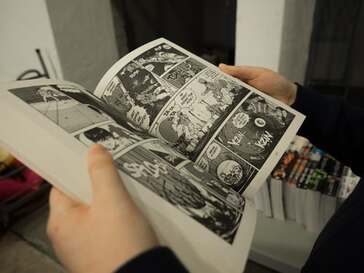|
by Angela Faustino  As someone who has dedicated her life to studying writing, I think a lot about what makes literature effective. There are the essentials of course, the rising and falling actions, a solid plot, conflict, a climax, and an end all resolution that concludes the story. I feel the most important thing that a story can give is a sense of other worldliness. When a piece is that good, it harnesses all of these elements, and leaves the reader with a sense of awe after its resolution. As an avid gamer, and someone who enjoys watching playthroughs of games, I often wonder: Why aren’t video games considered valid pieces of literature?
0 Comments
 by Dina Folgia When I was a child, I existed in a world ruled by print. If I wasn’t consuming media that had a front and back cover, chances are I wasn’t consuming it at all. I indulged in the occasional cartoon, maybe a movie or two every now and again, but by the time I was twelve my library of books far outweighed my library of DVDs. I was insatiable, unshakable, and I couldn’t picture myself growing up to craft anything besides literature. As I entered into my college experience and began to study writing as a possible career path, however, I was faced with a dilemma. After spending four years studying and dedicating myself to the craft, I began to grow complacent in the area of print media. It seemed like all my creative writing-based classes were teaching the same things, and that was based in creating publishable material and helping writers grow a thick enough skin to brave the cold, uncaring world of print writing. It wasn’t until I added on a media writing concentration and took several Radio, TV, and Film classes that I began to realize why I—and many of my peers—had grown so incredibly tired of print.  by Christopher M. Comparri The appeal of books, movies, television and any sort of story-telling platform can be boiled down to two key components: having a great story and having great characters to fill out said story. As viewers and readers, we often find ourselves rooting for certain characters and despising others to the pits of our very soul. This can be for any number of reasons: rooting for the underdog, finding a character that is relatable, finding one that embodies the essence of what we feel is right or wrong with the world. Finding the handful of characters that you feel strongly about builds an emotional tie between the content produced and the individual consuming it. However, the trend of incorporating huge casts of characters into stories is now having an adverse effect. People are finding too many characters to like or hate in passing. These characters are being masked as huge markers in a story, but the reality is quite different. In literature, sometimes less is more. CLICK TO VIEW INFOGRAPHIC  Photo: 12news Photo: 12news I’ve taught freshman composition courses for almost two years now, expecting my diverse body of students from multicultural backgrounds to all coalesce and perform to one standard above all others: White Vernacular English (WVE) or White American Vernacular English (WAVE). As writers, we pride ourselves on being open-minded yet authentic, and we hope our students do the same—as long as they adhere to what we consider valid style of writing. Why have the rigid, outdated principles the foundation of college composition was built on not shifted to accept other vernaculars? |
Archives
July 2024
Categories
All
|
|
Glassworks is a publication of Rowan University's Master of Arts in Writing 260 Victoria Street • Glassboro, New Jersey 08028 [email protected] |
All Content on this Site (c) 2024 Glassworks
|

 RSS Feed
RSS Feed
